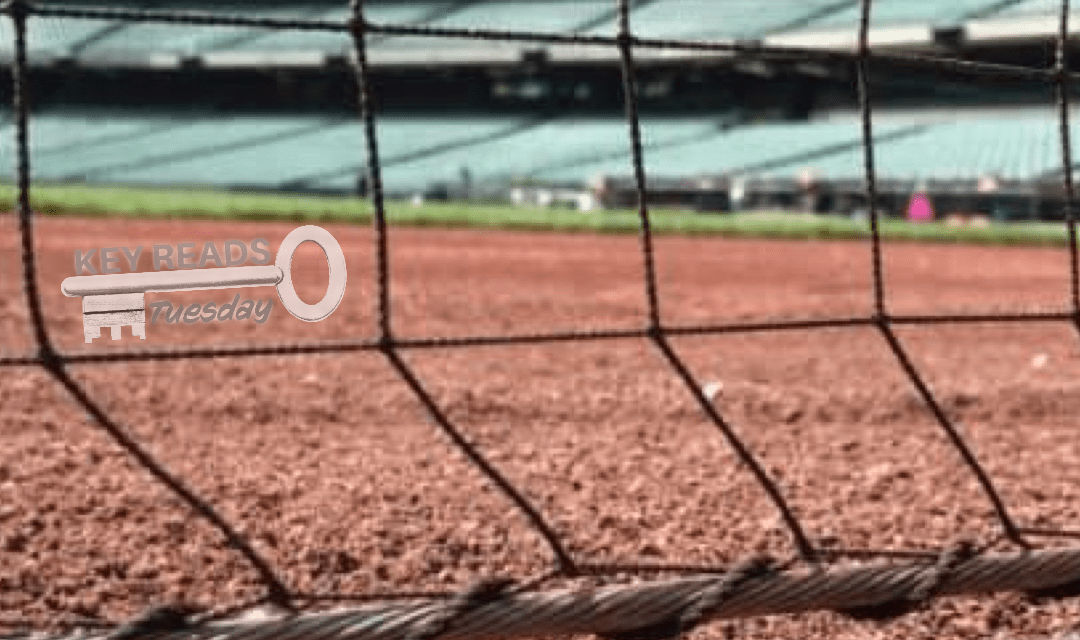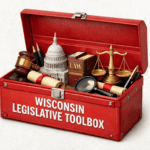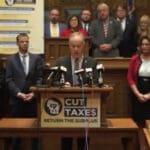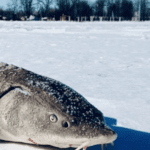Happy Brewers’ Home Opener!
We’ll leave the political arguments over the financing of stadium operations to other sites and other days. As for today, we’ve had it circled on the calendar for months, as the Brewers Opening Day is somewhat of a secular holiday for us. Here is a good rule of thumb if you ever wonder when Opening Day is or was for a particular year. Look at the weather forecasts and weather reports for April 1. Find the day within four days before or after that has/had the worst weather report. That’s Opening Day.
Like clockwork, the first pitch for this year’s edition is set for a little after 3pm today, when the area around American Family Field will be in the midst of several inches of ‘Wintery Mix” and enjoying a balmy 36° F.
Baseball begins anew each Spring and with it brings optimism.
With so many new faces on the team this season, most of us will be paying more attention to the front of the jerseys than the back, and perhaps that’s the way it should be.
Alas, from pleasant thoughts of teamwork and men playing boys’ games to the reality of today’s news.
It is Election Day. Some races to watch include the Wausau mayor’s contest, the two statewide referenda to ban Zuckerbucks, hundreds of local school board battles and school referenda all across the state, including Milwaukee where the funding request is an eventual annual quarter billion dollar boost.
We’re not in the prediction business, but we would not be shocked if a majority of the school referenda pass, but the statewide Constitutional amendments do not. As they say, every vote counts, so make sure to vote if you have not already done so.
Here are your Key Reads for Tuesday, April 2, 2024.
Republicans denounce Evers’ veto wave | The Center Square
Wisconsin Republicans are up in arms about Gov. Tony Evers latest wave of vetoes.
The governor scuttled 40 Republican proposals. The list includes vetoes of a tax cut for retirees in the state, a plan to set a wolf hunt number and vetoes of a child care tax credit and a proposal to keep road salt out of the state’s drinking water, both of which Evers has said were his biggest priorities.
Republican lawmakers said the governor is simply playing politics.
“While I’m completely disappointed for the residents of Wisconsin, I am certainly not surprised by the governor’s action. This isn’t the first tax cut he has vetoed – signaling his belief that the government, not the taxpayers, will do a better job of spending the state’s multi-billion surplus. I couldn’t disagree more,” Rep. David Steffen, R-Green Bay, said Monday.
State Rep. Elijah Behnke, R-Oconto, criticized the governor for vetoing the road salt legislation.
“Gov. Evers instead sided with trial lawyers despite increasing concern for the growing impact of road salt accumulating in our precious freshwater,” he said.
The road salt plan would have provided communities with incentives to cut their road salt use. New Hampshire, Illinois, Colorado and Minnesota already have similar programs.
Evers also scuttled a proposal that would have allowed local schools to hire superintendents who are not educators.
State Sen. Duey Stroebel, R-Cedarburg, said the idea was to give local schools more flexibility and open the pool for potential school administrators.
“Gov. Evers just proudly vetoed a bill that would have allowed school boards to exercise local control by choosing the superintendent of their liking. As a result, we remain locked in with some of the strictest licensing requirements in the region, which exacerbates our workforce problems,” Stroebel said. “Being superintendent is like being the CEO of a company. One does not need to have spent a lifetime in the field to effectively manage the professionals working for you. There are probably thousands of Wisconsinites who would do a great job serving their communities in this role who have not spent their entire careers licensed in a classroom. This veto maintains the absolute prohibition on locally elected officials considering anyone outside the box.”
If things don’t go the conservatives way at the polls today, an 11:1 fundraising disparity between the state’s two main political parties will be a big reason for the results. Let the spinning begin.
Wisconsin Democrats are burying Republicans in 2024 fundraising | Milwaukee Journal Sentinel
State records show that the state Republican Party brought in $863,553 in its state and federal accounts during the first three months of the year. Of that, $287,650 came in two donations in the past two weeks — $237,650 from Beloit billionaire Diane Hendricks and $50,000 from retired Racine businessman Fred Young.
By contrast, the state Democratic Party raised nearly $9.6 million in both federal and state accounts in the first quarter of the year, a ratio of more than $11 to $1…
Among the biggest givers to the state Democrats this year are Silicon Valley investor Reid Hoffman, who contributed $2 million; billionaire financier George Soros, $1 million; and Kenneth Duda, co-founder of cloud networking solutions provider Arista, $1 million…
Republicans are also pointing the fact that only 5% of the money that Democrats have raised in their state and federal accounts has come from individuals living in Wisconsin. The rest has come from out-of-state donors and party transfers.
“I’ve actually outraised them in-state (this year)” said Republican Party Chairman Brian Schimming. “In 2018, 60% of their money was in-state, and by 2020, it was down to 15%.”
Moving from the world of politics to the world of horticulture where reasonable adults can come together and tough problems can be managed.
Oak Wilt has been around for 80 years, but Wisconsin officials are not conceding the fight.
Wisconsin has a tool to combat disease endangering oaks | WPR
The Wisconsin Department of Natural Resources has developed a tool to slow the spread of oak wilt, a fungal disease killing thousands of trees each year.
Oaks, a keystone species in Wisconsin, are most susceptible to infection and to spreading the disease when trees or branches have been cut or damaged.
The DNR’s satellite mapping system tells forest owners when it’s the safest time to harvest or prune oak trees. Developed by the DNR and the University of Wisconsin-Madison in 2021, the mapping system is based on temperature and improves the accuracy of advise about maintaining forests as climate change and warm winters decrease predictability….
And the long-lived trees, growing to enormous size over centuries, are simply beautiful.
“Every year, we find a few new townships that have oak wilt in them,” Hillstrom said. “It’s complicated. We can’t reach every pocket. Not everybody is even aware that oak wilt is out there on the landscape. We do our best to educate what it looks like so people are aware of it and can hopefully respond in the best way they can.”
We make no apologies for our love of baseball, or the Brewers. In fact, we’ll take another opportunity to let you know just how much the Milwaukee Brewers are a part of the great history of this state.
Brief review of the long history of baseball in the Brew City| Dairyland Sentinel
In the early days of organized baseball, many teams called Milwaukee home, including several organizations which would be considered the equivalent of minor league teams at the time. Often, Milwaukee’s teams didn’t have official mascots or names beyond that of the city they called home. Sportswriters would bestow nicknames on these teams, and sometimes those names would be officially adopted.
Several early Milwaukee baseball teams were referred to as the Creams or the Cream Citys, in reference to the unique color of the bricks used in so many buildings in Milwaukee. The nickname the Brewers was also commonly used by scribes to refer to teams from the city that was home to some of the nation’s most successful breweries at the time.
More than a century ago, and long before Bambi’s Bombers and Harvey’s Wallbangers took the city by storm, the Milwaukee Brewers name was carried by men whose teams were just as eclectic.
From 1886 to 1892 the Milwaukee Brewers played in several different leagues. Their first two seasons were in the Northwestern League. From 1888 to 1891 the Brewers were a part of the Western Association.
The 1891 squad was a part of the American Association, having replaced a team from Cincinnati. They played in the Western League for one more season in 1892.
The Brewers reformed in 1894 and played in the Western League once again.The Western Association was renamed the American League in 1900 and became a major league the following year. After its lone major league season in 1901, in which they posted a dismal 48-89 record the franchise was relocated to St. Louis in1902 and renamed the St. Louis Browns. That 1901 American League season saw Milwaukee’s unit of journeymen and upstarts finish 35 ½ games behind the Chicago White Stockings!
Future teams would immediately carry the mantle of the Milwaukee Brewers. From 1902 through 1952 the minor league Milwaukee Brewers were a huge draw at the city’s famed Borchert Field. The Brewers were a mainstay of the American Association, which was formed in the city after the major league team departed for St. Louis…
In 1953 the Boston Braves moved to Milwaukee. The team name remained the Braves and the Milwaukee Brewers would not be seen again until 1970 when, just before the season began, the Seattle Pilots were sold and uprooted after only one big league season. This squad filled the void left after the Braves moved to Atlanta in 1966.
Since 1970, the Milwaukee Brewers have been Wisconsin’s Major League baseball team. From County Stadium to Miller Park (now named American Family Field) the Brewers have entertained millions of fans at home games each year, carrying on the proud tradition of the men who first played for teams called the Milwaukee Brewers in the century before the last.
It’s a great day for baseball!


















